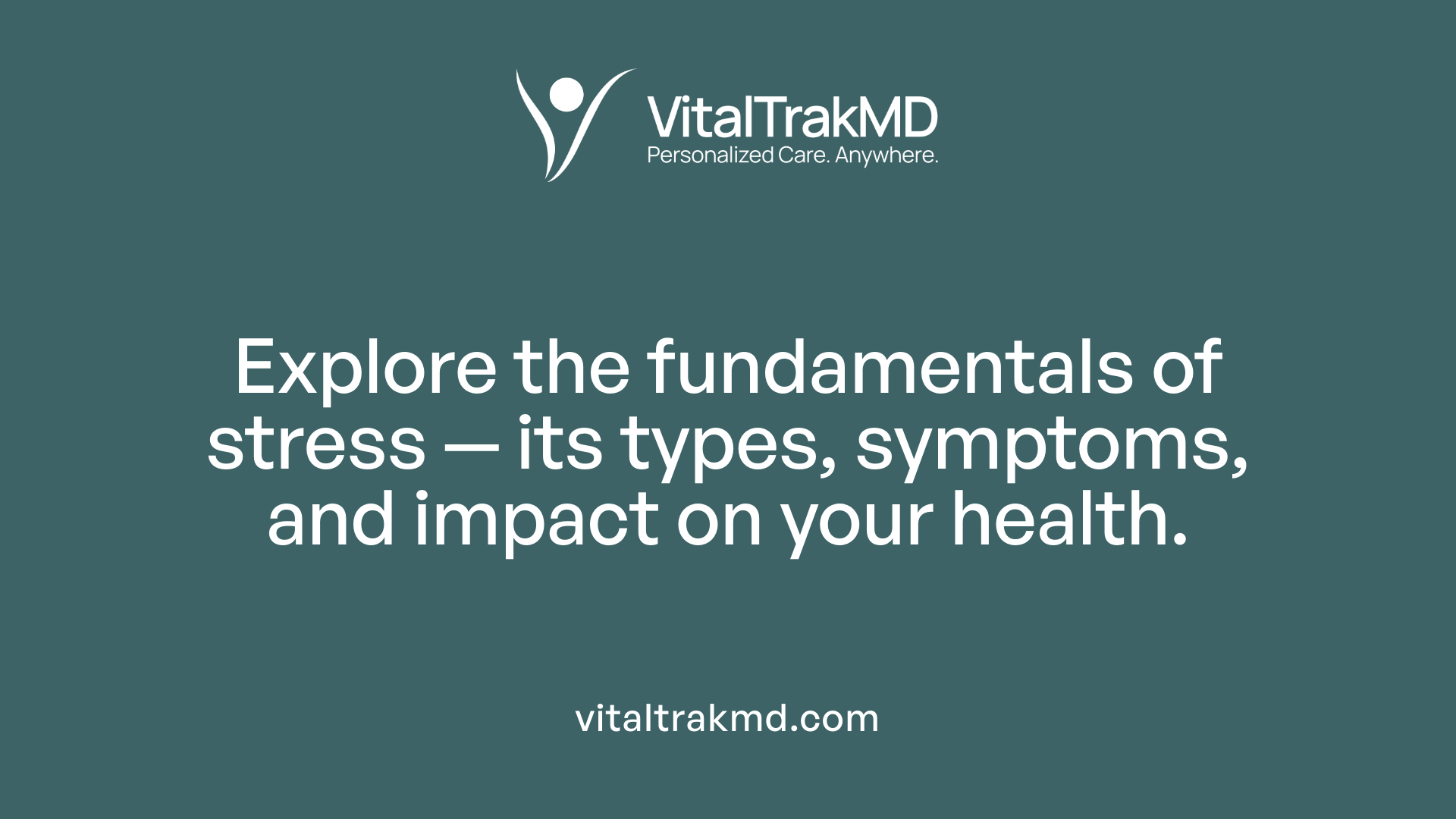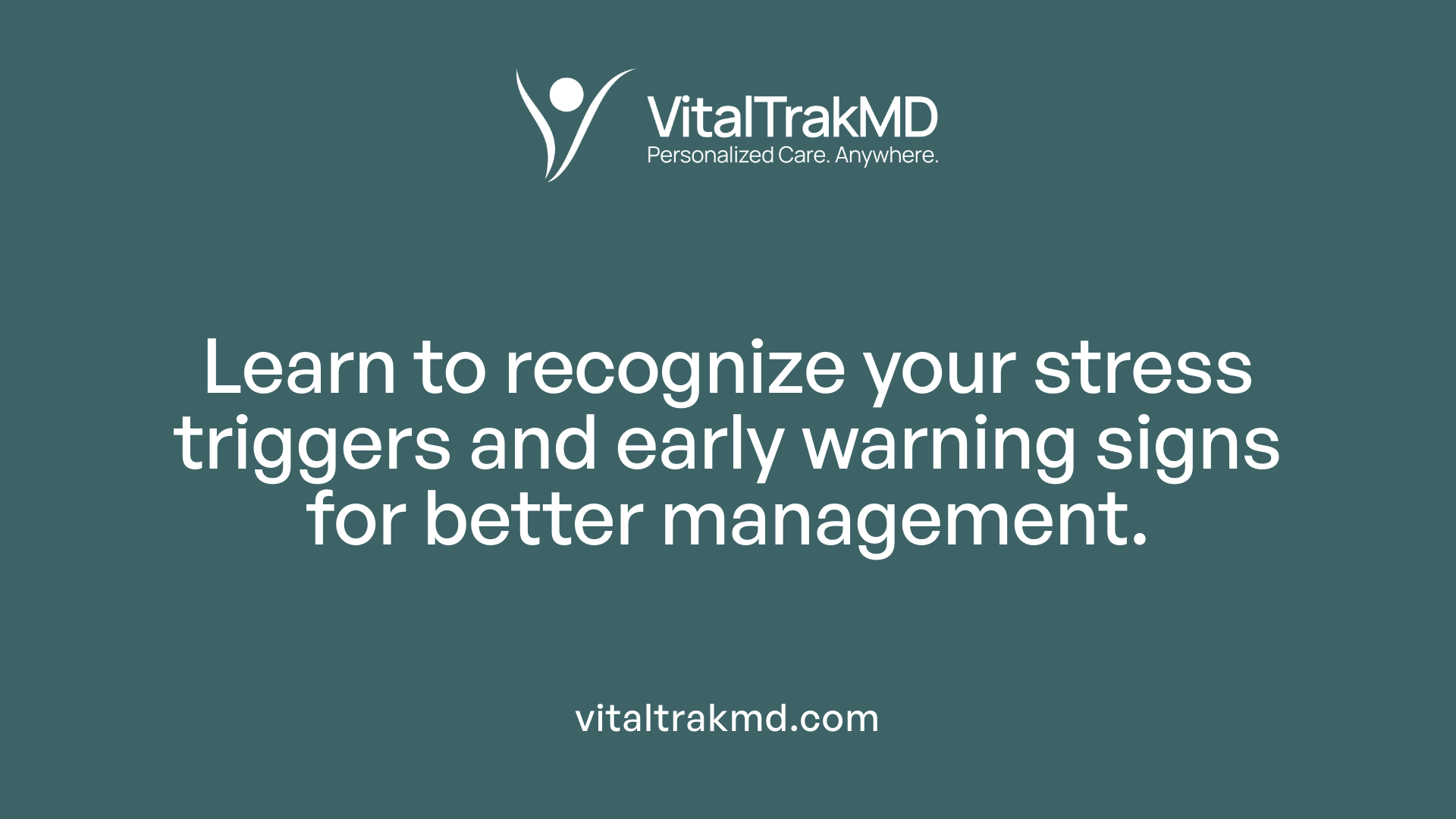Supporting Patients With Guidance on Effective Stress Management Techniques

The Hidden Burden of Stress on Health and Wellness
Stress is an inevitable part of life, influencing physical health, mental well-being, and the success of wellness and weight loss programs. Understanding how stress affects the body and mind, recognizing its triggers, and applying effective management techniques are crucial steps in supporting patients toward healthier, more balanced lives. This article explores comprehensive, evidence-based stress management strategies that care providers can guide patients through, ensuring integration with broader health and weight management goals.
Understanding Stress: Types, Symptoms, and Impacts on Health

What is stress and how does it affect the body?
Stress is the body’s natural response to demands and challenges, which may be physical or mental. When faced with stress, the body releases hormones like cortisol and adrenaline, which prepare it for a "fight or flight" reaction.
Differentiate eustress and distress
Stress can be categorized into eustress and distress. Eustress, or positive stress, motivates and enhances performance, helping individuals meet challenges effectively. In contrast, distress is negative stress that occurs when stress levels exceed an individual’s coping ability. Distress can cause health problems such as headaches, insomnia, high blood pressure, anxiety, and depression.
Common physical and psychological symptoms of stress
Stress commonly manifests in physical symptoms including headaches, muscle tension, fatigue, digestive issues, and elevated blood pressure. Psychologically, it can lead to anxiety, depression, irritability, and difficulty concentrating.
Long-term health consequences of chronic stress
When stress becomes chronic, it can trigger ongoing physical health problems such as heart disease, high blood pressure, diabetes, weakened immune function, and digestive troubles. Chronic stress also increases the risk of mental health disorders including anxiety disorders, depression, and panic attacks.
Impact on physical manifestations such as headaches, high blood pressure, fatigue
Physical symptoms like headaches, high blood pressure, and fatigue occur because constant stress hormones keep the body in a heightened state of alert. This ongoing activation wears down bodily systems, leading to persistent discomfort and health challenges.
Understanding the difference between normal stress responses and harmful chronic stress is essential for maintaining well-being and seeking effective stress management when needed.
Identifying Stressors and Early Warning Signs: The First Step to Managing Stress

How Can Individuals Recognize Their Stress Triggers?
Stress often arises from common triggers such as work pressures, family responsibilities, and financial challenges. Being aware of these sources is crucial for effective management.
The Role of Self-Awareness and Keeping a Stress Journal
Keeping a stress journal allows individuals to record stressful incidents alongside their emotional and physical responses. This practice helps reveal patterns and pinpoint frequent stressors.
Recognizing Symptoms and Warning Signs
Early signs of stress include irritability, fatigue, sleep problems, headaches, and muscle tension. Recognizing these symptoms early supports timely intervention.
Importance of Early Intervention to Prevent Chronic Stress
Identifying stress triggers and symptoms promptly is vital to prevent stress from becoming chronic. Early management reduces risks of long-term health problems and supports overall wellbeing.
Integrating Stress Management into Weight Loss and Wellness Programs

Role of Stress Management in Wellness and Weight Loss Success
Stress management is essential in comprehensive wellness and weight loss programs. Chronic stress can sabotage weight loss efforts by triggering unhealthy eating habits and disrupting hormonal balance. By addressing stress proactively, individuals improve their chances of achieving and maintaining healthy weight.
How Mental Wellness Affects Motivation, Adherence, and Coping
Mental wellness plays a crucial role in successful weight loss. It shapes motivation and helps maintain adherence to healthy behaviors. Stress management techniques like mindfulness and behavioral counseling reduce emotional eating and symptoms such as anxiety and depression. This support promotes resilience and self-esteem, which are critical to sustaining lifestyle changes and avoiding weight regain.
Incorporating Mindfulness, Behavioral Counseling, and Social Support in Programs
Wellness programs often include mindfulness practices, such as meditation and journaling, which aid emotional regulation and stress relief. Behavioral counseling helps individuals identify and modify negative thought patterns that undermine weight loss. Social support from groups or wellness centers fosters encouragement and accountability, further enhancing program success.
Physical Activity as a Dual Benefit for Stress Reduction and Weight Management
Physical exercise not only burns calories but also reduces stress hormones like cortisol while releasing mood-enhancing endorphins. Activities such as walking, yoga, swimming, and group classes offered at wellness centers help participants simultaneously manage stress and control weight, creating a positive feedback loop for overall well-being.
Nutrition's Role in Managing Stress and Supporting Weight Loss
A balanced diet rich in fruits, vegetables, and whole grains supports both stress reduction and effective weight management. Proper nutrition helps stabilize blood sugar and mood, reducing cravings and emotional eating. Nutritional counseling within wellness programs educates participants on choosing foods that promote mental health and facilitate sustainable weight loss.
Effective Stress Management Techniques Recommended for Patients

What are effective stress management techniques for patients?
Effective stress management integrates various strategies addressing both body and mind, tailored to individual needs.
Physical activities
Engaging in activities like walking, yoga (especially Hatha yoga), swimming, tai chi, and dancing promotes the release of endorphins, natural mood enhancers. These rhythmic exercises not only elevate mood but also help refocus the mind away from stressors.
Mindfulness and meditation
Practices such as mindfulness meditation, deep breathing exercises, and guided imagery foster calmness and improve emotional regulation. These techniques can be easily performed anywhere and serve as essential tools for managing daily stress.
Relaxation therapies
Progressive muscle relaxation and biofeedback, including heart rate variability biofeedback, are effective in reducing anxiety and stress symptoms. Wellness centers often provide access to these therapies as adjuncts for comprehensive care.
Healthy lifestyle habits
Adequate sleep (7-9 hours), a balanced diet rich in fruits, vegetables, and whole grains, and limiting caffeine, alcohol, and substances are crucial. These habits strengthen the body's resilience to stress and improve overall well-being.
Cognitive behavioral techniques
Journaling emotions and thoughts offer emotional release and insight into stress patterns. Practicing gratitude and assertiveness—such as learning to say no and delegating tasks—helps manage workload and emotional exhaustion.
Social connections and humor
Connecting with family, friends, and support groups provides emotional relief and coping resources. Incorporating humor and laughter reduces cortisol levels and induces positive physical changes that counter stress.
Wellness center resources
Comprehensive support is available through multidisciplinary wellness centers like at Wooster Community Hospital, offering services from personal trainers and therapists to nutritionists and mental health professionals. Utilizing these resources can enhance stress management outcomes.
By combining these techniques, patients can effectively manage stress, improving both physical and mental health.
Supporting Patients Through Structured Care Programs for Stress and Weight Management

How do care programs support individuals in maintaining weight loss?
Structured care programs play a vital role in helping patients manage stress and sustain weight loss by offering comprehensive support through multidisciplinary teams. These teams typically include therapists, nutritionists, personal trainers, and mental health professionals who collaborate to address both physical and psychological aspects of health.
Behavioral and psychological strategies form the foundation of these programs. Personalized plans cater to individual challenges by integrating counseling, goal setting, and education on stress management techniques such as mindfulness, relaxation exercises, and coping skills. This tailored approach helps patients develop resilience and healthy habits intrinsic to long-term maintenance.
Ongoing monitoring and support are essential. Programs often feature regular check-ins, group support sessions, and access to digital tools like apps for self-monitoring and progress tracking. This continuous engagement encourages accountability, motivation, and social connection, enhancing adherence to lifestyle changes.
Emphasizing consistent healthy behaviors—including balanced nutrition, regular physical activity, adequate sleep, and effective stress relief practices—addresses potential relapse triggers. Creating a supportive and nonjudgmental environment allows patients to openly discuss struggles, receive encouragement, and rebuild confidence when setbacks occur.
Through this integrated framework, care programs empower individuals to take charge of their wellness journey, making sustainable changes that improve both mental health and weight management outcomes.
Overcoming Challenges Faced by Patients in Stress and Weight Management Programs
What Are Common Challenges People Face in Weight Loss Care Programs, and How Can They Be Overcome?
Patients in stress and weight management programs often encounter several barriers that impede their progress. Lack of motivation frequently contributes to inconsistent engagement, while emotional eating triggered by stress can undermine efforts. Another common hurdle is weight plateaus, where individuals experience stalled progress leading to frustration. Accessibility and affordability further limit consistent participation in effective programs. Additionally, many individuals do not view obesity as a chronic disease, which may decrease their commitment to long-term care.
Healthcare providers face challenges of their own, including limited time during consultations and inadequate training to manage complex behavioral issues associated with stress and weight. This can reduce opportunities for personalized guidance and effective intervention.
To overcome these challenges, strategies that enhance motivation and sustain engagement are critical. Setting realistic and achievable goals provides direction and fosters a sense of accomplishment. Behavioral and educational support tailored to individual needs helps patients understand and manage triggers such as emotional eating.
Leveraging online programs presents a flexible avenue for patients to access resources and support at their convenience. These platforms can offer educational content, tracking tools, and community engagement to maintain momentum. Social support, including group exercise classes, support groups, and connections with family and friends, encourages accountability and emotional encouragement.
Addressing broader socioeconomic and environmental factors is also essential. Ensuring accessibility through affordable services and transportation options reduces barriers. Training healthcare providers to recognize and address stress-related behaviors during wellness encounters improves intervention quality and outcomes.
In essence, a comprehensive approach combining personalized care, technological tools, social connection, and systemic support can effectively address the obstacles faced by patients in stress and weight management programs, promoting lasting health improvements.
Practical In-the-Moment and Daily Stress Management Strategies
What quick and practical stress management strategies can patients use daily?
Managing stress effectively often relies on simple, practical techniques that can be used anytime throughout the day. Quick stress relief methods such as taking 5-minute breaks and practicing deep breathing exercises help counteract the body's stress response and promote immediate calmness. Sensory relaxation techniques, like focusing on soothing sounds or textures, can also reduce tension on the spot.
Journaling offers a valuable cognitive coping method by allowing individuals to express and process their thoughts and emotions, helping to clarify stressors and improve emotional well-being. Alongside this, good time management—prioritizing important tasks and delegating responsibilities—helps reduce feelings of overload. Assertiveness skills, like learning to say no and asking for help, play a crucial role in managing workload and preventing burnout.
Incorporating humor and laughter through jokes or playful activities lightens mental burdens and induces positive physical changes that lower stress. Spending time outdoors in nature has been shown to reduce stress levels and improve mental health. Balancing technology use by limiting social media exposure and taking breaks from news feeds prevents additional anxiety and fosters a healthier mindset throughout the day.
By integrating these strategies into daily routines, individuals can manage stress effectively and support their overall mental and physical well-being.
The Vital Role of Healthcare Providers in Guiding Stress Management
How can healthcare providers support patients in managing stress effectively?
Healthcare providers play a crucial role in helping patients manage stress by offering education on how stress affects physical and mental health. They inform patients about the symptoms of stress such as headaches, fatigue, and high blood pressure, emphasizing the importance of early recognition and management.
Providers encourage mindfulness and self-care practices, including relaxation techniques like deep breathing, meditation, yoga, and exercise, which have been shown to reduce stress and improve emotional well-being. Emphasizing good sleep hygiene and nutritional counseling also forms a key part of their recommendations.
During wellness exams, healthcare professionals screen for signs of stress and related mental health concerns by asking focused questions and observing physical symptoms. This proactive approach facilitates timely identification of stress issues.
Healthcare providers advocate for utilizing available resources such as multidisciplinary wellness centers offering personal trainers, therapists, and mental health experts, as well as advising patients to join support groups or community organizations that foster social connections and resilience.
For patients experiencing severe stress or mental health symptoms, providers take an active role in referring them to specialized mental health professionals or crisis resources, including immediate links to hotlines like the crisis hotline at 988.
Integration of physical and mental health care is emphasized, recognizing that managing stress effectively requires attending to both domains. By guiding patients through a comprehensive approach—including education, self-care strategies, resource referrals, and crisis intervention—healthcare providers empower individuals to develop resilience and maintain overall wellness.
Integrating Stress Management for Holistic Patient Care
Supporting patients with guidance on effective stress management is essential for their overall health, wellness, and weight loss success. By recognizing stress triggers early and utilizing a diverse set of evidence-based techniques—from physical activity and mindfulness to cognitive strategies and social support—patients can build resilience and improve health outcomes. Healthcare providers have a vital role in educating, motivating, and connecting individuals to multidisciplinary resources, fostering personalized and sustainable approaches. Ultimately, integrating mental wellness into care programs empowers patients to take charge of their health, prevent chronic stress, and thrive in their wellness journeys.
References
- 7 Ways to Manage Stress at Your Local Wellness Center
- Managing Stress | Mental Health
- Stress relievers: Tips to tame stress
- Stress Management: Strategies to Deal with Stress
- Stress Management: Meditation, Relaxation, Health Benefits
- Managing Stress in the Health Care Field - AFMC.org
- Stress Management Strategies - Mental Health at Cornell
- Mind and Body Approaches for Stress and Anxiety - nccih
- Stress Management Tools and Resources
- How Can You Effectively Manage Stress and Improve Your ...
Recent articles
Want to Feel Better and Live Healthier?
Join hundreds of patients taking control of their health with personalized care that fits their life – not the other way around.
Rated 4.8/5 by 32+ customers







